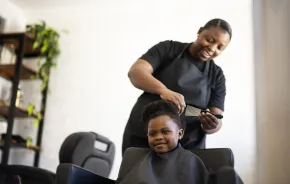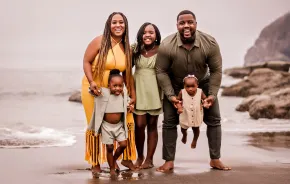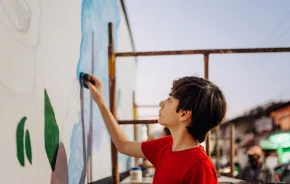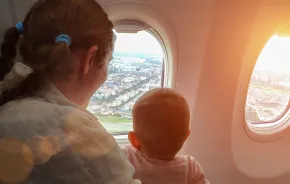
I’ve got the travel bug, and I’ve got it bad.
When I was 11, my family lived in London for a year. During the summer we traveled all over Europe. Thanks to my parents’ adventurous spirits, my love for travel blossomed. Over the years, the highlights of traveling overseas included a college semester in England, the Peace Corps, and teaching public health classes in Lithuania.
One of my dreams is to volunteer with my family somewhere abroad. There is a term for this: Voluntourism. You get to experience a different culture and see some amazing places while making a difference, small or large.
My husband, who works for the City of Seattle, has a sabbatical coming up. This could be a golden opportunity for us, if we can swing it.
My research started with a book, Smiling at the World, by Joyce Major, which is an inspiring account of one woman’s experience volunteering in 10 different countries for a month at a time. Major’s volunteer stints included an elephant sanctuary in Thailand, a conservation group in Italy, teaching English in China, and being a reporter in Ireland.
From her travels, Major experienced profound personal growth. Upon her return to Seattle, she closed her real estate business and now speaks and teaches classes about voluntourism.
“Volunteers need to feel that their contributions are part of something bigger in order to recognize the importance of the task at hand.” — Joyce Major
My friend Karen, who writes a blog for the Kirkland Patch, recently wrote about her experience sightseeing and volunteering in Guatemala.
Both these women are semi-retired with grown children and have the luxury of being independent and able to do this sort of thing. But, I wondered, can families do it too?
I connected with several families to find out more:

The Purnell family
Danielle and Paul Purnell, a mother-and-son duo, went to Ethiopia for 10 days with the Seattle nonprofit Water 1st to see more of the world, find out what they could do for others, and learn how Water 1st is impacting communities.
“We witnessed firsthand the amazing things that can flow from making clean and abundant water available and ending the long walks to water and cycles of disease and poverty,” said Danielle Purnell. “We even made a connection with Ethiopia's running community by donating T-shirts from our school's cross-country running team.”
Purnell and her son Paul, a middle schooler, helped one of the communities construct a water pipeline.
“After [we dug] alongside them for a few hours, the workers gathered together and sang and danced a thank you to us with shovels, pick axes and other tools in hand. It was wonderfully spontaneous and moving,” Danielle Purnell recalled.
She was particularly affected by the inner peace, happiness, and sense of community she says she saw among the Ethiopians, even though day in and day out it is a struggle for many of them to survive.
“The whole experience resonated with me as fun, meaningful, and exciting because everything I saw and heard was far from ordinary,” said Paul. He was especially intrigued by how much in common he had with other Ethiopian youngsters and found them to be “the most happy and friendly people I’ve met.”

A grandfather/granddaughter team: Frank Vukovich and Megan MacGregor
Frank Vukovich, who lives in Val d’Or, Quebec, is a retired teacher who has traveled extensively with his two grandchildren over the years, and several of those trips involved volunteering.
Vukovich ’s first volunteer experience teaching English for a month in China was “one of the most rewarding experiences of my teaching career.”
This was the catalyst which motivated him to take his grandchildren abroad to “maximize their learning experience” by volunteering.
Vukovich took Megan and Robbie, then teenagers, to Cusco, Peru for a week where they helped out in a day-care center in the morning, took Spanish lessons in the afternoon and taught English as a second language to teens in the evenings. Vukovich and MacGregor have also been to Italy and the Canary Islands, where they participated in week-long research projects on dolphins and whales.
“Watching them come to terms with working in a developing country and successfully grappling with a different culture and language was an unforgettable experience. They walked away from the experience aware of the fact that they could actually make a difference if they became involved,” said Vukovich.
“Many of the younger volunteers who were traveling on their own were confused as to why my grandfather was accompanying me. However, by the end of the trip . . . they saw that volunteering together had made our bond stronger, and although there was an age gap between us we truly respected each other as equals,” said MacGregor, now a 21-year-old student in Montreal.
“Volunteering really is the best way to travel.The costs are low and the gains are high. I felt I was making a difference,” she added.

The Kaye Family: Stuart, Valerie, Arin, and Matthew
The Kayes, who live in Westport, Conn., prefer to combine their vacations with both tourist and volunteer opportunities. They’ve been to Morocco, Israel, Belize, Costa Rica, and have even volunteered in several states in the U.S.
Today the kids, Arin and Matthew, are teenagers; the family began doing voluntourism trips when the kids were 7 and 8.
In Rabat, Morocco, they worked in a children’s hospital for kids with cancer and asthma. In Belize, they helped the locals learn about sustainable and organic farming. In New Orleans, they helped repair houses after Katrina.
“[Volunteering] is a way for us to give back and for our kids to see how other people live so they can be more appreciative of what they have,” explained Stuart Kaye.

A common theme emerged in my exchanges with these families: Kids begin to realize they have many food choices, access to water, transportation options, availability of electricity, and technology at their fingertips, while some of the rest of the world does not.
In vicariously experiencing this, kids learn not to take their privileged lives for granted.

Tips for planning your voluntourist stint
1. Do your homework. Choose your destination and project carefully. Consider the safety of the location and how challenging the project is. Choose something that is a little bit out of the children’s comfort zone, but not total cultural shock.
2. Ask yourself what you hope to get out of the experience. This helpful article on the Seattle Globalist explores some of the pitfalls of volunteering abroad, especially for such a short time, and whether that actually makes a difference.
3. Confirm your budget for this adventure. Be prepared to pay a program fee and for airfare, both of which are often not cheap.
4. Choose a dependable organization to work with. Research the organization and get references.
5. Involve your children in all aspects of planning your trip. Get their input in choosing the country and project. Do the research with them.
6. Provide incentives for completing a project. It could be a visit to a wonderful destination nearby.
7. Keep a record of your adventure. Keep a journal and take pictures. You can use this for a scrapbook or make a gift for the holidays. This will help you remember and reflect for years to come.
— with input from Frank Vukovich
Resources
Here are some of the organizations the families in this blog have volunteered with. (We have not used these organizations at ParentMap and have not personally vetted any voluntourism organization, so do your research.) We’d love to hear of any more you have experienced, or about your own voluntourism family adventure!
Rebuilding Together. This organization provides critical repairs and renovations for low-income homeowners across the United States.
Sustainable Harvest International. Works with families in rural farming communities in Belize, Honduras, Nicaragua and Panama.
Global Visionaries. Organizes trips that have a learning component embedded, but not volunteer opportunities.
Tethys Research Institute. A nonprofit working to study the marine environment.
A.W.F. Volunteering Abroad. An organization working on whale and dolphin conservation issues.
Global Volunteer Network. Organizes trips for volunteers.
Global Volunteers. Organizes trips for volunteers.
Cross-Cultural Solutions. Organizes trips for volunteers (it costs $2480 for a one-week program, not including air fare).
 Elizabeth Ralston is a writer with a public health background. She writes about topics on philanthropy, including profiles of inspiring people and organizations on her blog, The Inspired Philanthropist . When she is not writing, she enjoys spending time in the great outdoors with her family. You can follow her on Twitter.
Elizabeth Ralston is a writer with a public health background. She writes about topics on philanthropy, including profiles of inspiring people and organizations on her blog, The Inspired Philanthropist . When she is not writing, she enjoys spending time in the great outdoors with her family. You can follow her on Twitter.









